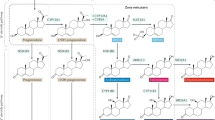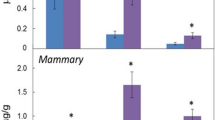Abstract
THE in vivo metabolism of œstradiol-17β leads to the formation of ring D ketols with a hydroxyl group at C16. These compounds are of interest because they may be either intermediates in the further transformation of œstrone or end products formed from the oxidation of ring D glycols. 16α-Hydroxyœstrone has been isolated from the urine of pregnant women by Marrian, Watson and Panattoni1. This communication reports the identification of the recently synthesized 16β-hydroxyœstrone2 as a metabolite of œstradiol-17β in man. The product is formally related to the œstrogen metabolite Δ1,3,5(10) œstratriene-3,16β,17β-triol3.
This is a preview of subscription content, access via your institution
Access options
Subscribe to this journal
Receive 51 print issues and online access
$199.00 per year
only $3.90 per issue
Buy this article
- Purchase on Springer Link
- Instant access to full article PDF
Prices may be subject to local taxes which are calculated during checkout
Similar content being viewed by others
References
Marrian, G. F., Watson, E. J. D., and Panattoni, M., Biochem. J., 65, 12 (1957).
Biggerstaff, W. R., and Gallagher, T. F., J. Org. Chem., 22, 1220 (1957).
Marrian, G. F., and Bauld, W. S., Biochem. J., 59, 136 (1955).
Author information
Authors and Affiliations
Rights and permissions
About this article
Cite this article
BROWN, B., FISHMAN, J. & GALLAGHER, T. 16β-Hydroxyœstrone, a Metabolite of Œstradiol in Man. Nature 182, 50–51 (1958). https://doi.org/10.1038/182050b0
Issue Date:
DOI: https://doi.org/10.1038/182050b0
This article is cited by
Comments
By submitting a comment you agree to abide by our Terms and Community Guidelines. If you find something abusive or that does not comply with our terms or guidelines please flag it as inappropriate.



